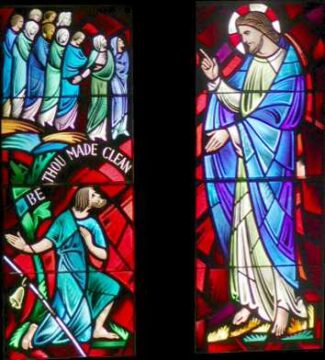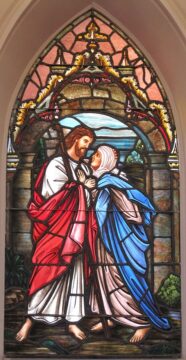Franciscan Friar Fr. Paul Gallagher reflects on the Gospel for the Twenty-eighth Sunday of Ordinary Time, October 9, 2022. The content is edited by Franciscan Sister of Christian Charity Sister Anne Marie Lom and Joe Thiel. The excerpts from the Sunday readings are prepared by Joe Thiel. To read or download the complete pdf with excerpts for your prayer, please click here: Franciscan Gospel Reflection October 9 2022. Excerpts are from the Lectionary for Mass for Use in the Dioceses of the United States of America, second typical edition © 2001, 1998, 1997, 1986, 1970 Confraternity of Christian Doctrine, Inc., Washington, DC. Used with permission. All rights reserved. No portion of this text may be reproduced by any means without permission in writing from the copyright owner. Photo: Cadetgray, CC BY-SA 3.0 <https://creativecommons.org/licenses/by-sa/3.0>, via Wikimedia Commons; public domain, Wikimedia Commons.
Luke 17:11-19
 As Jesus continued his journey to Jerusalem, he traveled through Samaria and Galilee. As he was entering a village, ten lepers met him. They stood at a distance from him and raised their voices, saying, “Jesus, Master! Have pity on us!” And when he saw them, he said, “Go show yourselves to the priests.” As they were going they were cleansed. And one of them, realizing he had been healed, returned, glorifying God in a loud voice; and he fell at the feet of Jesus and thanked him. He was a Samaritan. Jesus said in reply, “Ten were cleansed, were they not? Where are the other nine? Has none but this foreigner returned to give thanks to God?” Then he said to him, “Stand up and go; your faith has saved you.”
As Jesus continued his journey to Jerusalem, he traveled through Samaria and Galilee. As he was entering a village, ten lepers met him. They stood at a distance from him and raised their voices, saying, “Jesus, Master! Have pity on us!” And when he saw them, he said, “Go show yourselves to the priests.” As they were going they were cleansed. And one of them, realizing he had been healed, returned, glorifying God in a loud voice; and he fell at the feet of Jesus and thanked him. He was a Samaritan. Jesus said in reply, “Ten were cleansed, were they not? Where are the other nine? Has none but this foreigner returned to give thanks to God?” Then he said to him, “Stand up and go; your faith has saved you.”
Background:
In the gospel from last week, the disciples asked for greater faith. In response, Jesus told a parable that likened faith to the smallest of seeds, the mustard seed. Today’s gospel follows last week’s text and continues to focus on faith—in this case, the faith of ten lepers.
The Babylonian Exile (587-537 B.C.) was a very difficult time for the Hebrew people. They were forced to leave their homeland, their places of worship, and especially the temple in Jerusalem. They wondered why God, who had freed them from slavery, led them through the desert, helped them defeat their enemies, and helped them become a nation, would now let them become captives to the Babylonians. Ezra, a Hebrew priest, believed God had turned his face from them because they had not kept themselves pure. He blamed their captivity on the fact that some had taken non-Jewish women as wives. In doing so, the boundary between God’s holy people and the rest of humanity had been broken. He believed that in order to regain God’s favor, they needed to reestablish that boundary and maintain purity. As part of the effort to regain their purity as a nation, he advocated that non-Jewish women and their heirs be expelled from their community. All those who were expelled were Samaritans.
The Hebrew people, influenced by Ezra and others who adopted his reasoning, became very concerned with maintaining proper boundaries as a way to maintain ritual purity. The traditions that dealt with social, physical, and personal boundaries took more importance. For example, the involuntary discharges of bodily fluids became a breach of the natural boundary of one’s body. Leprosy was not Hansen’s disease, but a skin condition that left the skin flaky or scaly. It was repulsive because the flakes would get on clothing, etc. The flaking broke the boundary of the body of the human person. A group of lepers might include both Hebrews and Samaritans because both were understood to be in the same state, excluded from God’s people. Those infected forfeited all privileges or status they might otherwise claim. Law forbade them to enter cities and participate in the normal activities of life.
Jesus’ ministry, especially in Luke’s gospel, challenges the clear boundary between the pure and holy people of God and those who were not pure. Luke often portrays Jesus reaching across those boundaries to people in ways that challenge the clear distinctions of the day. Luke knew he was challenging his audience by including these tests in his gospel.
When Jesus encounters the lepers, they keep the appropriate distance, and they call to him as “Master.” Master was the term only the disciples used for Jesus. Without normal relationships with others, begging was a way of survival. Here the lepers do not request alms, but mercy. In this culture everyone would recognize that the lepers are asking Jesus to give them what is owed to them, to meet his interpersonal obligation. Jesus had already confronted the strict boundaries between the people and the blind, the lame, and the sinners. The lepers were saying that Jesus owed them the same kind of consideration. They were also owed what every other Jew of the day is owed, the right to participate in the religious rituals. For his part, Jesus acknowledges their relationship to him and their relationship to every other Jew of the day. He sends them to the Jewish priests. Priests are the ones who can verify that a cure has taken place, and can allow the person to re-enter normal relations within the community. The ten lepers apparently leave without seeing any change in their condition, and they have to trust in Jesus’ instruction.
 The one who returns is known as a Samaritan, something that did not matter when he was a leper. He, like the others, acted on faith; trusting that Jesus’ instruction would be fulfilled. However, unlike the others, he is a Samaritan and remains an outcast. He would not be permitted to enter the temple in Jerusalem to make the appropriate offering in thanks for the cure that has taken place. So, instead, he returns to Jesus to express thanks to the agent of God through whom the healing has taken place. But there is also the fact that in expressing his thanks, the Samaritan is completing his obligation to repay Jesus. Usually, one waited for an opportunity to repay a good deed with another good need, such as when the other was in need. However, the Samaritan knows that there will be no other opportunity. Even if the lepers should return, which often was the case, it is highly unlikely that he will ever encounter Jesus again and certainly will not be permitted to seek him out.
The one who returns is known as a Samaritan, something that did not matter when he was a leper. He, like the others, acted on faith; trusting that Jesus’ instruction would be fulfilled. However, unlike the others, he is a Samaritan and remains an outcast. He would not be permitted to enter the temple in Jerusalem to make the appropriate offering in thanks for the cure that has taken place. So, instead, he returns to Jesus to express thanks to the agent of God through whom the healing has taken place. But there is also the fact that in expressing his thanks, the Samaritan is completing his obligation to repay Jesus. Usually, one waited for an opportunity to repay a good deed with another good need, such as when the other was in need. However, the Samaritan knows that there will be no other opportunity. Even if the lepers should return, which often was the case, it is highly unlikely that he will ever encounter Jesus again and certainly will not be permitted to seek him out.
Those who are hearing this parable know Jesus’ point. This Samaritan is no better or worse a person than the other nine. They were all the same. They were all lepers. Being cured of their illness has not changed who they really are. The others are now free to join in the religious practices of the community and be included among God’s chosen people. The Samaritan is still officially excluded, and is seen as unworthy to be counted among God’s chosen. Jesus’ last words to him state what all who have heard the parable know in their hearts. God, who in his mercy was present to him as a leper, is also present to him as a Samaritan.
Reflection Questions:
- Have you ever been the outsider in a group? What do you remember about that experience?
- Are there people who would not be received well in your congregation on Sunday morning?
- Lepers who were either Samaritan or Jewish could live together because they were both outcasts. Where are the places in your community where unlikely groups of people can come together?
- Do you know people who are particularly good at looking past boundaries?
- What do you think happened as the ten left Jesus and one knew he could not show himself to the priests in Jerusalem?
- The disciples had asked that their faith be strengthened. After Jesus’ interaction with the Samaritan leper, he tells him that his faith has saved him. What does this statement say to you?
- Do you know people who seem to live without much sense of gratitude? Do you also know people who seem to foster a spirit of gratitude in their life? What impact does that have on them as a person?
- Have you ever confessed not fostering a spirit of gratitude?
- Can you take some time to talk with God honestly about whatever it is that seems most important to you in this gospel text?


